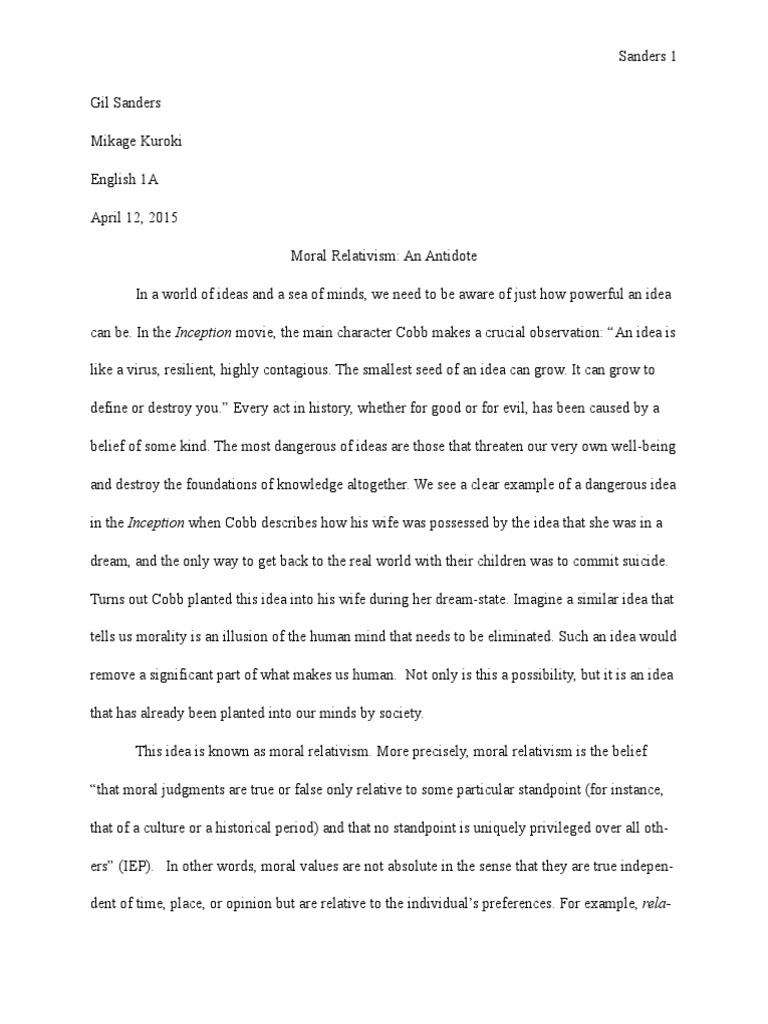Moral relativism, as articulated by philosopher Donaldson, presents an intriguing lens through which one can scrutinize ethical paradigms and value systems across diverse cultures. This philosophical perspective posits that moral judgments and ethical standards are not universally applicable but are instead contingent upon the specific societal contexts in which they are situated. Such a viewpoint challenges the hegemonic narratives of absolute morality, which often dominate discourses in ethical philosophy, leading many to grapple with its implications on a personal and global scale.
At its core, Donaldson’s moral relativism invites us to reassess our preconceived notions of morality. By affirming that moral values arise from individual or cultural perspectives rather than cosmic absolutes, this theory encourages a shift in perspective—one that is essential in today’s pluralistic societies. It suggests that what is considered “right” or “wrong” can vary drastically, dictated by temporal, geographical, and sociocultural influences. This opens a Pandora’s box of questions regarding the legitimacy of moral judgments and the nature of human rights across differing landscapes.
To commence, one must appreciate the foundational principles of moral relativism. This philosophy articulates that ethical norms are tethered to the cultural fabric from which they emerge. For instance, practices such as polygamy or varied death penalty applications may be regarded as acceptable in certain cultures, while anathema in others. Thus, Donaldson’s framework does not merely present a passive acceptance of cultural variances but emphasizes the need for an empathetic understanding of these differences. The acknowledgment of this moral plurality proposes an essential question—does this relativity threaten the universality of human rights?
Conversely, it can be posited that moral relativism serves as an antidote to ethnocentrism, a prevalent plight within global discourse. By dismantling the idea that one’s cultural norms are superior, the philosophy promotes a more inclusive and tolerant worldview. Individuals are encouraged to critically evaluate their ethical stances while gaining insights into alternative moral frameworks. Such a process cultivates a deeper respect for human experience, one that transcends national borders and engenders cooperation in addressing shared challenges—be they social justice, environmental sustainability, or economic disparity.
Nevertheless, the embracement of moral relativism is not devoid of complexities. Critics argue that an unwavering adherence to relativism may lead to nihilism, where no moral judgment holds significance. This raises pertinent inquiries: If every belief system is valid, how do we adjudicate in instances of egregious harm, or when cultural practices contravene the basic tenets of human dignity? Donaldson’s moral relativism grapples with this paradox, positing that understanding cultural contexts can still allow for critical engagement with practices that may seem ethically indefensible to outsiders.
One of the pivotal discussions within the realm of moral relativism is the interplay between cultural context and ethical standards. This balance necessitates a rigorous examination of what it means to advocate for “universal” human rights in light of distinct socio-cultural norms. The implementation of global agreements on human rights raises crucial questions about the imposition of external moral standards. For instance, would the advocacy for women’s rights in certain cultures be viewed as an infringement or a form of liberating intervention? Donaldson’s perspective suggests that moral judgments must take into account the narratives and lived experiences of individuals within those cultural frameworks.
Furthermore, moral relativism encourages a robust engagement with the concept of moral education. If ethical values are shaped by cultural influences, equipping individuals with the tools to critically navigate these frameworks becomes paramount. This requires not only an understanding of one’s own cultural morals but also the ability to empathize with contrasting viewpoints. Such an approach accentuates the need for educational systems that promote intercultural dialogue and the examination of moral philosophies through a comparative lens. By fostering an appreciation for moral diversity, we can collectively address the common challenges facing humanity, encompassing climate change, poverty, and social inequity.
Innovatively, Donaldson’s moral relativism posits that ethical discussions can be a breeding ground for collaborative solutions. In an era where environmental sustainability is critical, moral relativism aids in understanding the variabilities in how different societies engage with climate issues. The ethics surrounding conservation, resource management, and environmental justice are not universally agreed upon; thus, this philosophy provides a platform for cross-cultural dialogue. For example, indigenous practices rooted in sustainability can be juxtaposed against industrialized nations’ behaviors, spurring a rich discourse that can inform comprehensive environmental policies.
The potential convergence of moral relativity and environmental activism heralds a significant shift for global policymaking. It invites stakeholders to incorporate diverse ethical perspectives into decision-making processes, ensuring that solutions are tailored to fit the local contexts while addressing broader crises. Morality, within this framework, becomes a tool for problem-solving that prioritizes inclusivity and shared humanity over divisive doctrines. This kind of collaborative ethics fosters resilience, a pivotal element in combating climate change and advocating for social justice.
In conclusion, Donaldson’s moral relativism is an enriching philosophical viewpoint that challenges the longstanding dichotomies of right and wrong. It compels individuals to embrace complexity, fostering an environment of understanding amidst diversity. By piquing curiosity about ethical norms and encouraging dialogue across cultural divides, this framework not only enhances moral discourse but also actively contributes to the global mission of resolving pressing challenges. Embracing this philosophical shift can pave the way for a more compassionate and interconnected world where ethical divergence is not a barrier, but rather a catalyst for collective growth and understanding.
